高中英语反意疑问句用法归纳
高中英语反义疑问句的用法new
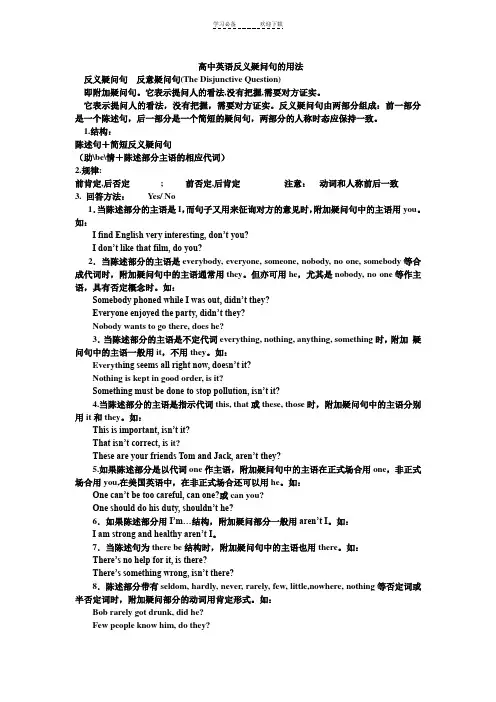
高中英语反义疑问句的用法反义疑问句反意疑问句(The Disjunctive Question)即附加疑问句。
它表示提问人的看法,没有把握,需要对方证实。
它表示提问人的看法,没有把握,需要对方证实。
反义疑问句由两部分组成:前一部分是一个陈述句,后一部分是一个简短的疑问句,两部分的人称时态应保持一致。
1.结构:陈述句+简短反义疑问句(助\be\情+陈述部分主语的相应代词)2.规律:前肯定,后否定; 前否定,后肯定注意:动词和人称前后一致3. 回答方法:Yes/ No1.当陈述部分的主语是I,而句子又用来征询对方的意见时,附加疑问句中的主语用you。
如:I find English very interesting, don’t you?I don’t like that film, do you?2.当陈述部分的主语是everybody, everyone, someone, nobody, no one, somebody等合成代词时,附加疑问句中的主语通常用they。
但亦可用he,尤其是nobody, no one等作主语,具有否定概念时。
如:Somebody phoned while I was out, didn’t they?Everyone enjoyed the party, didn’t they?Nobody wants to go there, does he?3.当陈述部分的主语是不定代词everything, nothing, anything, something时,附加疑问句中的主语一般用it,不用they。
如:Everyth ing seems all right now, doesn’t it?Nothing is kept in good order, is it?Something must be done to stop pollution, isn’t it?4.当陈述部分的主语是指示代词this, that或these, those时,附加疑问句中的主语分别用it和they。
高中英语反义疑问句(详细)

反义疑问句反义疑问句(The Disjunctive Question) 即附加疑问句。
它表示提问人的看法,没有把握,需要对方证实。
反义疑问句由两部分组成:前一部分是一个陈述句,后一部分是一个简短的疑问句,两部分的人称时态应保持一致。
主要形式:陈述部分肯定式+疑问部分否定式;陈述部分否定式+疑问部分肯定式。
1简述陈述部分和疑问部分要么前肯后否,要么前否后肯。
这类反义疑问句有时带有感情色彩,表示惊奇,愤怒,讽刺,不服气等。
例如:You call this a day's work,don't you?你说这就叫一天的活儿,不是吗?2句式句子结构1.陈述部分肯定句+疑问部分否定句(可记为前肯后否).例:They work hard, don’t they?2.陈述部分否定句+疑问部分肯定句(可记为前否后肯).例:You didn't go, did you?句子类型一种是反义的附加疑问句;一种是非反义的附加疑问句。
简单来说,就是“前肯后否”或“前否后肯”。
3读法规则反义疑问句陈述部分用降调,问句部分可升可降。
提问者对陈述部分把握较大时,问句部分用降调;反之用升调。
4速记方法前肯后否,前否后肯,前be后be,前情态后情态,前无be或情态后加助,并改为否定,时态一致。
5主语一般词语附加疑问句中主语用和主句一致的主语,用主格。
附加疑问句随从句。
不定代词当陈述部分的主语是(1)one时,后面的疑问句可用one/he.(2)no one时,后面附加疑问句中主语用they。
(3)everything,anything,nothing,something时,附加疑问句中主语用it 不用they(4)this, that,或those, these时,附加疑问句中主语用it或they.(5)everyone,everybody,someone,somebody,anyone,nobody等时,附加疑问句中主语一般用they (口头语,非正式文体)/he(正式文体)。
高中英语知识点归纳反义疑问句的用法
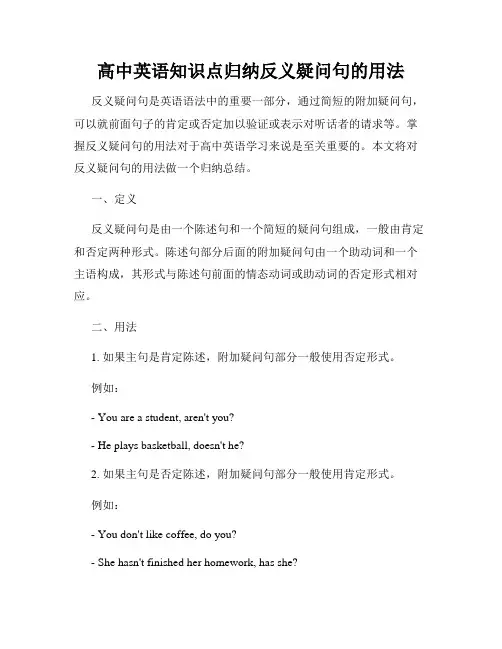
高中英语知识点归纳反义疑问句的用法反义疑问句是英语语法中的重要一部分,通过简短的附加疑问句,可以就前面句子的肯定或否定加以验证或表示对听话者的请求等。
掌握反义疑问句的用法对于高中英语学习来说是至关重要的。
本文将对反义疑问句的用法做一个归纳总结。
一、定义反义疑问句是由一个陈述句和一个简短的疑问句组成,一般由肯定和否定两种形式。
陈述句部分后面的附加疑问句由一个助动词和一个主语构成,其形式与陈述句前面的情态动词或助动词的否定形式相对应。
二、用法1. 如果主句是肯定陈述,附加疑问句部分一般使用否定形式。
例如:- You are a student, aren't you?- He plays basketball, doesn't he?2. 如果主句是否定陈述,附加疑问句部分一般使用肯定形式。
例如:- You don't like coffee, do you?- She hasn't finished her homework, has she?3. 如果主句是祈使句,附加疑问句部分使用will you。
例如:- Please pass me the salt, will you?- Let's go for a walk, will you?4. 如果主句是陈述句的一部分或修饰语从句,整个句子都使用附加疑问句的形式。
例如:- I know he is busy, doesn't he?- It seems that she doesn't like him, does she?三、特殊用法1. 在以Let us或Let's开头的句子中,附加疑问句部分使用shall we。
例如:- Let's go, shall we?2. 在带有never的陈述句中,附加疑问句使用ever。
例如:- He has never been to Paris, has he?3. 反义疑问句有时候用来征求对方的意见、请求等。
(完整版)反意疑问句的用法归纳
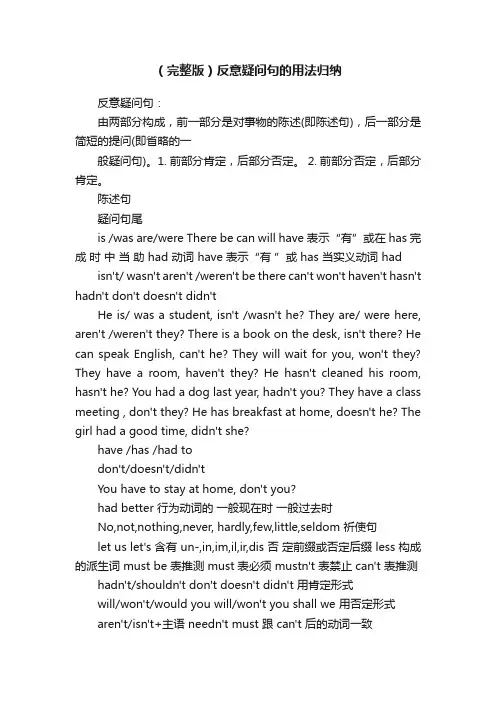
(完整版)反意疑问句的用法归纳反意疑问句:由两部分构成,前一部分是对事物的陈述(即陈述句),后一部分是简短的提问(即省略的一般疑问句)。
1. 前部分肯定,后部分否定。
2. 前部分否定,后部分肯定。
陈述句疑问句尾is /was are/were There be can will have 表示“有”或在 has 完成时中当助 had 动词 have 表示“有”或 has 当实义动词 had isn't/ wasn't aren't /weren't be there can't won't haven't hasn't hadn't don't doesn't didn'tHe is/ was a student, isn't /wasn't he? They are/ were here, aren't /weren't they? There is a book on the desk, isn't there? He can speak English, can't he? They will wait for you, won't they? They have a room, haven't they? He hasn't cleaned his room, hasn't he? You had a dog last year, hadn't you? They have a class meeting , don't they? He has breakfast at home, doesn't he? The girl had a good time, didn't she?have /has /had todon't/doesn't/didn'tYou have to stay at home, don't you?had better 行为动词的一般现在时一般过去时No,not,nothing,never, hardly,few,little,seldom 祈使句let us let's 含有 un-,in,im,il,ir,dis 否定前缀或否定后缀 less 构成的派生词 must be 表推测 must 表必须 mustn't 表禁止 can't 表推测hadn't/shouldn't don't doesn't didn't 用肯定形式will/won't/would you will/won't you shall we 用否定形式aren't/isn't+主语 needn't must 跟 can't 后的动词一致We'd better go now, hadn't/shouldn't we? They like playing football, don't they? He likes music, doesn't he? The woman bought a book, didn't she? He has hardly done his homework, has he? Please turn it on, will/won't/would you? Let us help him, will/won't you Let's have a rest, shall we? She dislikes it, doesn't she? You are unhappy, aren't you? You are hopeless, aren't you? He must be happy, isn't he ? You must do it today, needn't you? You mustn't talk like that, must you? He can't be a doctor, is he?I am 主从复合句 I think/believe/guess/ suppose+宾语从句并列句 used toaren't /ain't I; am I not I am your friend, aren't I一般跟主句一致He said she had been there, didn't he?动词和主语跟从句一 I think he'll come to help us, won't he? 致,用肯定还是否定 I don't think he is clever, is he? 根据主句来确定与邻近的分句一致Mary is here, but she was here just now, wasn't she?usedn't/didn'tHe used to be a teacher, usedn't/didn't he?5陈述句主语疑问句尾主语例句this, thatitThis is your brother, isn't it?These, thosetheyThese are not books, are they?oneone, heOne can't be always young, can one/he?something, anythingitNothing is serious, is it?everything, nothingEverything seems all right, doesn't it?everybody, everyoneEveryone knows this, don't they/doesn't he?somebody, someoneNobody likes to lose money, does he?anybody, anyonethey ,heNo one came , did they?nobody, no one,noneeither, neithereach ofthey ,heEach of the boys had an apple, didn't he /they?some(none) ofIt 或 they ,you None of the food was delicious, was it?Some of the men have come back, haven't they?or, and , neither…nor, either…or, both…and 复数代词Neither you nor I am wrong, are we? Both Tom and Jack came, didn't they?not only… but also not...but 等连接的并列主语不定式,动名词,从句或词组 the+ 形容词表示一类人 there 引起的句子it 复数代词 thereTo learn English well isn't easy, is it? Swimming is great fun,isn't it? The poor had no right to speak at that time, did they? There stands a house and a lot of trees, doesn't一、选择填空they? 6.--That's wrong, isn't it? -- ______1.Jim is a driver,_____?A. Yes, it is.B. Yes, it isn't.A. does heB. doesn't heC. is heD. isn't heC. No, it is.D. Yes, it was.2.You have a sports meeting every year,___? 7. Let's take a short rest, ______?A. have youB. do youA. do weB. aren't weC. haven't youD. don't youC. will youD. shall we3. He has never watched such an important8. Five-year-old children are too young to gomatch , _____ he?to school, ________ they?A. hasn'tB. hasC. isD. isn'tA. areB. aren'tC. wereD. have4.They have to work at once,______ they?9. Hundreds of people lost their lives in theA. haveB. haven'tC. doD. don'taccident,_______ they?5. She often feels tired,______ she?A. don'tB. didn'tC. doD. didA. doesn'tB. doesC. isD. isn't10.There isn't any bread on the table, ______?6A. isn't thereB. is thereC. has thereD. is it11. Mr King can not speak Chinese,____ he?A.doesn'tB. doesC. can'tD. can12. Lily didn't come to school, did she?____. She was ill in bed.A.No ,she didB. Yes , she did.C. No ,she didn't.D. Yes ,she didn't13.--She isn't a teacher, is she?--_____. She works in a hospital.A.No ,she isB. Yes , she is.C. No ,she isn't.D. Yes ,she isn't14.Lily looks like Lucy,_______?A. is LilyB. isn't sheC. does LillyD. doesn't she15.Tom often has lunch at school,_____?A. doesn't TomB. doesn't heC. does TomD. doesn't he16. Your family has no colour TV___it?A. hasn'tB. doesn'tC.isD. has17.You could hardly believe what he had said, _____ you?A. couldB. couldn'tC. canD. were18. --You don't smoke, do you?--______.A. Yes, I don'tB. No, I doC. No, I don'tD. Yes, I am.二、完成下列反意疑问句.1.You are late, ________ __________?2.He is on time,_________ _________?3.They were in the classroom just now,________ _________?4.She was ten years old last year_________________?5. They are going hiking next Sunday,________ _________?6.That cat is running up the tree.7.Ann is going to help me with my English8 There is some water in the bottle,___________________?9.There are many soldiers over there, _______ __________?10.He can skate, __________ ___________? 11.My parents can play chess,_____ ______? 12. They will work on the farm,________ _________? 13. My parents will visit my grandparents next Monday,________ _________? 14. They have written nine books since 1995,________ _________? 15, The woman has already found her son. ,________ _________? 16. They have three balls,_______ ______? 17. Jack has two sister,________ _______? 18.They have six classes every day,________ _________? 19.Tom has lunch at home,_____ _________?20.The students had a good time last Sunday,___________ ____________? 21. We have to finish it,______ ________? 22. The workers had to take the first bus, ________ _________? 23. You had better stay at home today, _________ __________? 24.We clean our classroom every day, ________ _________? 25. He watches TV on Saturday evening,________ _________? 26. The boys often play football on the playground,________ _________? 27.The singerswent to H.K yesterday, ________ _________? 28.They studied hard last year,________ _________? 29.They planted many trees last month,________ _________? 30.This pen is yours,_________ __________? 31.That was a wonderful film,______ _____?32.Everything is ready, ________ ________? 33.There is nothing wrong with the radio,___734.He did little homework yesterday, _______ __________?35.You'd like some coffee,______ ______? 36.Let's have a rest, _______ ____________? 37.Let us read the text, ________ ________?38.Don't read in bed, _________ _________? 39. Stop laughing,_______ __________? 40. He has to go there at eight,______ _____? 41.He has never been to Beijing, _____ ____? 42.She can hardly speak,_______ ________? 43.Few people know her here______ _____? 44.His mother was unhappy when she heard the news, _____ _______? 45.She dislikes watching football match____ ______? 46.He used to swim in the river,____ _____? 47.I think your brother is right, ____ ______?48. I don't think he will go there,____ _____?选择疑问句选择疑问句说话人对问题提出两个或两个以上的选项,让对方选择回答。
英语反义疑问句的14种常考特殊用法,备战中考一定要掌握!
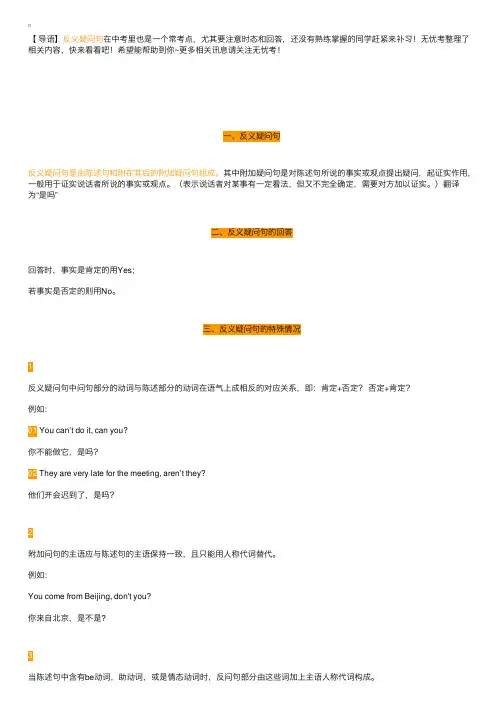
【导语】反义疑问句在中考⾥也是⼀个常考点,尤其要注意时态和回答,还没有熟练掌握的同学赶紧来补习!⽆忧考整理了相关内容,快来看看吧!希望能帮助到你~更多相关讯息请关注⽆忧考!⼀、反义疑问句反义疑问句是由陈述句和附在其后的附加疑问句组成。
其中附加疑问句是对陈述句所说的事实或观点提出疑问,起证实作⽤,⼀般⽤于证实说话者所说的事实或观点。
(表⽰说话者对某事有⼀定看法,但⼜不完全确定,需要对⽅加以证实。
)翻译为“是吗”⼆、反义疑问句的回答回答时,事实是肯定的⽤Yes;若事实是否定的则⽤No。
三、反义疑问句的特殊情况1反义疑问句中问句部分的动词与陈述部分的动词在语⽓上成相反的对应关系,即:肯定+否定?否定+肯定?例如:01 You can’t do it, can you?你不能做它,是吗?02 They are very late for the meeting, aren’t they?他们开会迟到了,是吗?2附加问句的主语应与陈述句的主语保持⼀致,且只能⽤⼈称代词替代。
例如:You come from Beijing, don't you?你来⾃北京,是不是?3当陈述句中含有be动词,助动词,或是情态动词时,反问句部分由这些词加上主语⼈称代词构成。
Be动词包括:am, is, are, was, were助动词有:do, does, did, have(⽤在完成时), has(⽤在完成时)等情态动词有:can, could, may, might, must, will, would, shall, should例如:01 He will go home, won’t he?他要回家了,是吗?02 She doesn’t like to eat popcorn, does she?她不喜欢吃爆⽶花,是吗?4have的不同⽤法,反义疑问句⽤不同的动词。
(1)have表“有”时,反义疑问句谓语动词⽤have/do都⾏。
高中英语反义疑问句的用法
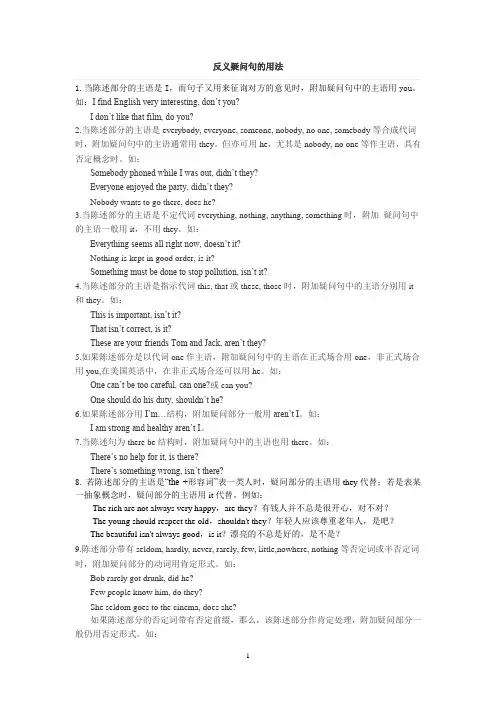
反义疑问句的用法1.当陈述部分的主语是I,而句子又用来征询对方的意见时,附加疑问句中的主语用you。
如:I find English very interesting, don‟t you?I don‟t like that film, do you?2.当陈述部分的主语是everybody, everyone, someone, nobody, no one, somebody等合成代词时,附加疑问句中的主语通常用they。
但亦可用he,尤其是nobody, no one等作主语,具有否定概念时。
如:Somebody phoned while I was out, didn‟t they?Everyone enjoyed the party, didn‟t they?Nobody wants to go there, does he?3.当陈述部分的主语是不定代词everything, nothing, anything, something时,附加疑问句中的主语一般用it,不用they。
如:Everything seems all right now, doesn‟t it?Nothing is kept in good order, is it?Something must be done to stop pollution, isn‟t it?4.当陈述部分的主语是指示代词this, that或these, those时,附加疑问句中的主语分别用it 和they。
如:This is important, isn‟t it?That isn‟t correct, is it?These are your friends Tom and Jack, aren‟t they?5.如果陈述部分是以代词one作主语,附加疑问句中的主语在正式场合用one,非正式场合用you,在美国英语中,在非正式场合还可以用he。
高中英语反义疑问精选--句用法--实用归纳
高中英语反义疑问句用法概括一、反意疑问句的一般状况1.当陈说部分的主语是:等 everyone, everybody, someone, no one, nobody, somebody 合成代词时,附带疑问句的主语非正式文体中常常 they 用。
(也能够按语法一致原则用单数。
)2.当陈说部分以 one 不定代词做主语时,附带问句的主语在正式常场用 one,非正式场适用 he。
3.当陈说部分的主语是不定式、动名词、从句、 this 或 that ,附带疑问句的主语用 it 。
(是those, these 则用 they )4.当陈说部分的主语是表示物的不定代词 everything, anything, nothing 等,附带问句的主语用 it 。
5.陈说部分带有否认词或半否认词,比如: never, hardly, scarcely, seldom, no, none, no one, rarely, nowhere, nothing, nobody, few, little 等,附带疑问句的动词要用必定形式。
6.假如陈说部分中的否认词仅带有否认的前缀或后缀,那么该陈说句应作必定句办理,附带疑问句应用否认形式。
二、常有句型的反意疑问句7.当陈说部分是 there be 存在句型时,附带疑问句的主语也用 there 。
8.叹息句的附带疑问句,其谓语要求用否认句。
9.祈使句后边的附带疑问句问题A) 祈使句能否认形式,附带疑问句只好用 will you 。
B) 祈使句是必定形式,附带疑问句用必定、否认均可。
C) Let 开头的祈使句要注意:1.Let ’s 在乎义上包括讲话的对方在内,表示提出建议或征采对方建议,其反意疑问句常常用shall we 。
2. Let us 在乎义上一般不包括讲话的对方在内,表示恳求对方同意做某事的含义, let 有allow的意思。
附带疑问部分用 will you 。
高中英语知识点归纳反义疑问句的特殊用法
高中英语知识点归纳反义疑问句的特殊用法反义疑问句是英语中常见的语法结构,用于表达询问一件事情时,对方预期的答案是否定的情况。
它由一个正向陈述句和一个反向疑问句组成。
在高中英语学习中,学生需要掌握反义疑问句的特殊用法,包括表示推测、请求确认、提供信息以及表示意愿等方面。
本文将对这些特殊用法进行归纳总结。
表示推测:1. 表示对方可能了解某事,但并不确定时,可使用反义疑问句来请求确认或提供信息。
例句:He can speak Chinese, can't he?解析:这句话表示说话者认为对方可能会说中文,但并不确定,因此使用了反义疑问句来请求对方提供信息。
2. 当说话者根据已有的信息进行推测时,可使用反义疑问句来征求对方的意见或确认。
例句:You must be tired, aren't you?解析:这句话表示说话者根据对方的状况或行为进行了判断和推测,现在希望对方来确认是否真的疲劳。
请求确认:1. 当说话者希望对方确认说话者所提供的信息是否正确时,可使用反义疑问句。
例句:You understand, don't you?解析:这句话表示说话者希望对方确认自己所说的内容是否被理解。
2. 当说话者希望对方重复确认某个问题时,也可以使用反义疑问句。
例句:You are coming to the party, aren't you?解析:这句话表示说话者希望对方确认是否会参加派对,并希望得到对方的回答。
提供信息:1. 当说话者希望提供某个事实或消息,并希望对方确认或接受时,可使用反义疑问句。
例句:The concert is at 8 o'clock, isn't it?解析:这句话表示说话者希望对方确认音乐会的时间,并期待对方肯定地接受。
2. 当说话者希望提供有关自己或他人的信息,并期待对方提出问题时,也可以使用反义疑问句。
例句:She is from France, isn't she?解析:这句话表示说话者提供了有关某人的国籍信息,并期待对方针对这个信息提出问题,比如询问她会不会说法语等。
英语中反义疑问句的用法归纳
英语中反义疑问句的用法归纳反义疑问句用法归纳一、基本概念反义疑问句由两部分组成:前一部分是一个陈述句,后一部分是一个简短的疑问句,两部分的人称和时态应保持一致。
二、基本用法1. 肯定陈述句 + 否定疑问句例如:You like music, don't you? (你喜欢音乐,不是吗?)2. 否定陈述句 + 肯定疑问句例如:He doesn't like sports, does he? (他不喜欢运动,是吗?)3. 祈使句 + 反义疑问句(1)Let's 开头的祈使句,用 shall we?例如:Let's go for a walk, shall we? (我们去散步,好吗?)(2)Let us 开头的祈使句,用 will you?例如:Let us have a rest, will you? (让我们休息一下,好吗?)(3)其他祈使句,用 will you?例如:Open the door, will you? (打开门,好吗?)4. 含有 must 的反义疑问句(1)must 表示“必须”时,用 needn't例如:You must finish your homework today, needn't you? (你今天必须完成作业,不是吗?)(2)must 表示推测“一定,肯定”时,根据实际情况而定例如:He must be very tired, isn't he? (他一定很累了,不是吗?)5. 含有否定词的反义疑问句当陈述句中有 never, few, little, nothing, nobody 等否定词时,反义疑问句用肯定形式。
例如:There is nothing in the box, is there? (盒子里什么都没有,是吗?)三、固定搭配1. “I am + 表语”,反义疑问句用“aren't I”例如:I'm late, aren't I? (我迟到了,不是吗?)2. 陈述部分是“there be”结构,反义疑问句用“be there”例如:There is a book on the desk, isn't there? (桌子上有一本书,不是吗?)3. 当陈述部分主语是不定代词 everyone, somebody, nobody, everyone 等时,反义疑问句用 they 或 he例如:Everyone is here, aren't they? (大家都在这儿,不是吗?)4. 当陈述部分主语是 this, that 时,反义疑问句用 it;当陈述部分主语是 these, those 时,反义疑问句用 they例如:This is a pen, isn't it? (这是一支钢笔,不是吗?)5. 当陈述部分是主从复合句时,反义疑问句与主句的主语和谓语保持一致例如:He said he would come, didn't he? (他说他会来,不是吗?)双语例句:1. I have a lot of friends, don't I? (我有很多朋友,不是吗?)2. She doesn't speak French, does she? (她不会说法语,是吗?)3. Have a cup of coffee, will you? (喝杯咖啡,好吗?)4. We should study hard, shouldn't we? (我们应该努力学习,不是吗?)5. They have been to Beijing, haven't they? (他们去过北京,不是吗?)6. You aren't a doctor, are you? (你不是医生,对吧?)7. There are some apples on the tree, aren't there? (树上有一些苹果,不是吗?)8. Nobody knows the answer, do they? (没人知道答案,对吧?)9. This isn't your book, is it? (这不是你的书,对吧?)10. Those are beautiful flowers, aren't they? (那些是漂亮的花,不是吗?)11. He can swim very well, can't he? (他游泳游得很好,不是吗?)12. She never tells lies, does she? (她从不说谎,对吧?)13. We had a great time yesterday, didn't we? (我们昨天玩得很开心,不是吗?)14. If it rains tomorrow, we won't go hiking, will we? (如果明天下雨,我们就不去徒步了,对吧?)15. You think he is right, don't you? (你认为他是对的,不是吗?)16. Mary has few friends here, does she? (玛丽在这儿几乎没朋友,对吧?)17. The boy doesn't like vegetables, does he? (这男孩不喜欢蔬菜,是吗?)18. Everyone wants to be happy, don't they? (每个人都想快乐,不是吗?)19. I'm a good student, aren't I? (我是个好学生,不是吗?)20. He told you the truth, didn't he? (他告诉你真相了,不是吗?)。
反义疑问句的18种特殊用法
2.感叹句。感叹句后加反意疑问句时,其反意疑问句需用be的一般现在 时态的否定形式。 例如: What fine weather, isn't it? 多好的天气啊,是吧?
3.陈述部分主、谓语是I am...时,反意疑问句用aren't I 或ain't I ,而不
是am not I (可用am I not) 例如:I'm working now, aren't I? 我在工作,是吗? 4.陈述部分的主语是everything, nothing, anything或something 时, 反意疑问句的主语应用代词it。 例如:Something is wrong with my radio, isn't it? 我的收音机出毛病了,是吧. Nothing is right , is it ? 5.陈述部分的主语是 everybody, everyone, anybody, anyone, somebody, someone, nobody, no one, none, neither 时, 其反意疑问句的主语需用复数 代词they。 例如: Everyone is here, aren’t they? 大家都到了,是吗? No one knows about it, do they? 没有人知道这件事,对吗
9.陈述部分有have to 时,其反意疑问句要用助动词的否定形式。 例如: You have to water the vegetables every day, don't you? 你每天都要浇菜,对吧? 10.陈述部分是there be句型时,其反意疑问句中要用there。 例如: There was a hospital here, wasn't there? 过去这儿有家医院,是 吗? 11.陈述部分有had better时,反意疑问句中要用hadn't。 例如:We had better go to school at once, hadn't we? 我们现在最好马上去上学,好吗? 12.当陈述部分含有情态动词must时,我们便要分析一下must的含义。 如果must 作“一定;要;必须”讲,反意疑问句须用mustn't或 needn't;而当must作推测意义“一定是;必定”讲时,反意疑问句则 需根据must后的动词原形选用相应的形式。 例如:He must work hard at physics, mustn't he? 他必须努力学物理,是 吧? Tom must be at home,isn't he? 汤姆一定在家,是吧? She must have read the book,didn’t she ?
- 1、下载文档前请自行甄别文档内容的完整性,平台不提供额外的编辑、内容补充、找答案等附加服务。
- 2、"仅部分预览"的文档,不可在线预览部分如存在完整性等问题,可反馈申请退款(可完整预览的文档不适用该条件!)。
- 3、如文档侵犯您的权益,请联系客服反馈,我们会尽快为您处理(人工客服工作时间:9:00-18:30)。
高中英语反意疑问句用法归纳一、反意疑问句的一般情况1.当陈述部分的主语是:等everyone, everybody, someone, no one, nobody, somebody合成代词时,附加疑问句的主语非正式文体中往往they用。
(也可以按语法一致原则用单数。
)2.当陈述部分以one不定代词做主语时,附加问句的主语在正式常场用one,非正式场合用he。
3.当陈述部分的主语是不定式、动名词、从句、this或that,附加疑问句的主语用it。
(是those, these则用they)4.当陈述部分的主语是表示物的不定代词everything, anything, nothing等,附加问句的主语用it。
5.陈述部分带有否定词或半否定词,例如:never, hardly, scarcely, seldom, no, none, no one, rarely, nowhere, nothing, nobody, few, little等,附加疑问句的动词要用肯定形式。
6.如果陈述部分中的否定词仅带有否定的前缀或后缀,那么该陈述句应作肯定句处理,附加疑问句应用否定形式。
二、常见句型的反意疑问句7.当陈述部分是there be 存在句型时,附加疑问句的主语也用there。
8.感叹句的附加疑问句,其谓语要求用否定句。
9.祈使句后面的附加疑问句问题A) 祈使句是否定形式,附加疑问句只能用will you。
B) 祈使句是肯定形式,附加疑问句用肯定、否定均可。
C) Let开头的祈使句要注意:1.Let’s 在意义上包含谈话的对方在内,表示提出建议或征求对方意见,其反意疑问句往往用shall we。
2. Let us 在意义上一般不包含谈话的对方在内,表示请求对方允许做某事的含义,let 有allow的意思。
附加疑问部分用will you。
3. Let me 开头表示请求,附加疑问句用will you,或用may I。
三、复合句的反意疑问句10.当陈述部分是一个(带that引导宾语从句的)主从复合句时,附加疑问句的主谓要和主句的主谓保持对应关系。
但是,当陈述部分的主语是:I suppose, I think, I believe, I imagine, I expect等结构时,附加疑问句的主语和谓语要和从句的主语,谓语保持一致关系。
而且要注意到否定的转移问题。
11.当陈述部分是I’m sure that,;we are sure;I’m afraid that;We are sure that;I feel sure that 等后面跟宾语从句时,反意疑问句与后面的宾语从句一致。
12.当陈述部分是并列句时,附加疑问句的主谓语要和离它最近的句子的主谓保持对应关系。
四、关于情态动词的反意疑问句13.陈述部分中有have一词,且表示“所有”含义时,附加疑问句部分既可用have也可用do。
14.陈述部分中有have to,附加疑问句部分用do。
15.含有ought to 的反意疑问句,陈述部分是肯定的,疑问部分用shouldn't / oughtn't +主语。
He ought to know what to do, oughtn't he? / shouldn't he?16.陈述部分有used to,附加疑问句部分可用used 也可以用did 。
17.陈述部分有needn’t时,附加疑问句部分用need但有时也可用must。
18.陈述部分有must,且表示“必须”时,附加疑问句部分用mustn’t,如果表示“必要”则用needn’t。
19.陈述部分中是mustn’t表示“禁止”时,附加疑问句部分用must。
陈述部分中的must表示“一定”、“想必”等推测意义时,附加疑问句部分而是根据陈述部分的谓语动词或其助动词来定。
20.陈述部分是I wish,表示询问或征求意见,附加疑问部分用may I。
21.弄清陈述句中的’d rather = would rather;’d better = had better附加疑问句部分前者用would,后者用had。
其它特殊结构的反意疑问句22.陈述部分的主语是each of...结构时,附加疑问句在强调整体时用they,当作个别时用he。
23.陈述部分有neither...nor...(either...or...)做并列主语,附加疑问部分根据其实际逻辑意义而定。
Neither you nor I am engineer, are we?24.陈述部分是:I’m ....结构,附加疑问句一般用aren’t I?25. 陈述部分有had better + v. 疑问句部分用hadn't you?You'd better read it by yourself, hadn't you?26. 陈述部分有would rather +v.,疑问部分多用wouldn't +主语。
He would rather read it ten times than recite it, wouldn't he?27. 陈述部分有You'd like to +v. 疑问部分用wouldn't +主语。
You'd like to go with me, wouldn't you?28. 带情态动词dare或need的反意疑问句,疑问部分常用need (dare ) +主语。
We need not do it again, need we ?He dare not say so, dare you?当dare, need 为实义动词时,疑问部分用助动词do + 主语。
She doesn't dare to go home alone, does she?反意疑问句完成下列句子1、Few of them hurt themselves in the accident last night, ___________ ?2.--You’ve never seen dinosaur eggs, have you ?--_______________. How I wish to visit the Dinosaur World.3、His sister had a bad cough, _________she?4、Mr. Green went to Shenzhen on business last week, ________?5. John can hardly understand any Chinese, _________he?6、Don’t smoke in the meeting-room, _________?7、Lucy, you clean the blackboard today, _______ ?8. Miss Cheng will never forget her first visit to Canada ,________?9、The lady couldn’t say a word when she saw the snake,__________?10、__________the population of china? 1,300,000,000.11、---______I go and meet you at the airport?---No ,thanks, dear . I can take a taxi home.12、------________is the Confucian Temple(孔庙) from here?------It’s about 10 minutes’ walk.13、-----_________may I keep these books?-----two weeks.14、Tina is unhappy now, ____________?15、---You won’t follow his example, will you ?---________________, I don’t think he is right.16、----__________do you go to Hong Kong?----sorry , I’ve never been there.17、---The boy has to stay at home to look after his little sister,_________?---Yes, because his mother has gone shopping.18、----You lent me some money a few months ago.-----_________? I don’t remember lending you any money .19、My uncle has never been to a foreign country,_____________?20、There is some water in that bottle, ___________?21、----_____________will the foreign students be back from NanJing?----In two days, I think .22、---Let’s go and play football,__________?---That’s wonderful.23. I don’t think that the necklace is made of diamond, __________?24. His wife had the carpets and the curtains cleaned, ____________?25. It’s my son’s wedding next week, and I have to do my best for that,__________?26. Harry wouldn’t become a teacher if it hadn’t been for the holiday, __________?27. No one left here yesterday,_____________?28. Birds rarely build nests in our garden,_____________?29. You must have been to the Great Wall, ____________?30. Learning how to repair motors takes a long time, _____________?31. They must have stayed at home last night,____________?32. There’s not much news in today’s newspaper, _____________?33. They need our help badly at the moment, ______________?34. She is unfit for the position, _____________?35. I wish to visit America, _____________?36. She’s been a worker here for many years, ______________?37. What beautiful flowers, ______________?38. Mother used to live in a poor village, ____________?39.You’d better go at once, _____________?40.I am very interested in Mark Twain’s novels, ____________?41. He never gets up late , ?42. Don’t go out ,?43. Everything begins to grow in spring, ?44. He can hardly finish the work, ?45. Let us go home , ?46. You think he is a good student, ?47. Nobody knows where she lives, ?48. Few students can answer the question, ?49. You needn’t attend the meeting, ______________________?50. We need to come on Sunday, ________________?语法填空之反意疑问句(教师版)完成下列句子1、Few of them hurt themselves in the accident last night, ___________ ? did they2.--You’ve never seen dinosaur eggs, have you ? No, I haven’t --_______________. How I wish to visit the Dinosaur World.3、His sister had a bad cough, _________she? didn’t4、Mr. Green went to Shenzhen on business last week, ________? didn’t he5. John can hardly understand any Chinese, _________he? can6、Don’t smok e in the meeting-room, _________? will you7、Lucy, you clean the blackboard today, _______ ?will you8. Miss Cheng will never forget her first visit to Canada ,________? will she9、The lady couldn’t say a word when she saw the snake,__________? could she10、__________the population of china? 1,300,000,000. What’s11、---______I go and meet you at the airport? Shall---No ,thanks, dear . I can take a taxi home.12、------________is the Confucian Temple(孔庙) from here? How far ------It’s about 10 minutes’ walk.13、-----_________may I keep these books? How long -----two weeks.14、Tina is unhappy now, ____________? isn’t she15、---You won’t follow his example, will you ?---________________, I don’t think he is right. No, I won’t16、----__________do you go to Hong Kong? How often ----sorry , I’ve never been there.17、---The boy has to stay at home to look after his little sister,_________? doesn’t he ---Yes, because his mother has gone shopping.18、----You lent me some money a few months ago.-----_________? I don’t remember lending you any money . Did I19、My uncle has never been to a foreign country,_____________? has he20、There is some water in that bottle, ___________? isn’t there21、----_____________will the foreign students be back from NanJing?----In two days, I think . How soon22、---Let’s go and play football,__________? shall we---That’s wonderful.23. I don’t think that the necklace is made of diamond, __________? is it24. His wife had the carpets and the curtains cleaned, ____________? didn’t she25. It’s my son’s wedding next week, and I have to do my best for that,__________? don’t I26. Harry wouldn’t become a teacher if it hadn’t been for the holid ay, __________? would he27. No one left here yesterday,_____________? did they28. Birds rarely build nests in our garden,_____________? do they29. You must have been to the Great Wall, ____________? haven’t you30. Learning how to repair motors takes a long time, _____________? doesn’t it31. They must have stayed at home last night,____________? didn’t they32. There’s not much news in today’s newspaper, _____________? is there33. They need our help badly at the moment, ______________? don’t they34. She is unfit for the position, _____________? isn’t she35. I wish to visit America, _____________? may I36. She’s been a worker here for many years, ______________? hasn’t she37. What beautiful flowers, ______________? aren’t they38. Mother used to live in a poor village, ____________? u sedn’ t she/didn’t she39.You’d better go at once, _____________? hadn’t you40.I am very interested in Mark Twain’s novels, ____________? aren’t I41. He never gets up late , ? does he42. Don’t go out ,? will you43. Everything begins to grow in spring, ? doesn’t it44. He can hardly finish the work, ? can he45. Let us go home , ? will you46. You think he is a good student, ? don’t you47. Nobody knows where she lives, ? do they/does he48. Few students can answer the question, ? can they49. You needn’t attend the meeting, ______________________? need you50. We need to come on Sunday, ________________? don’t we。
